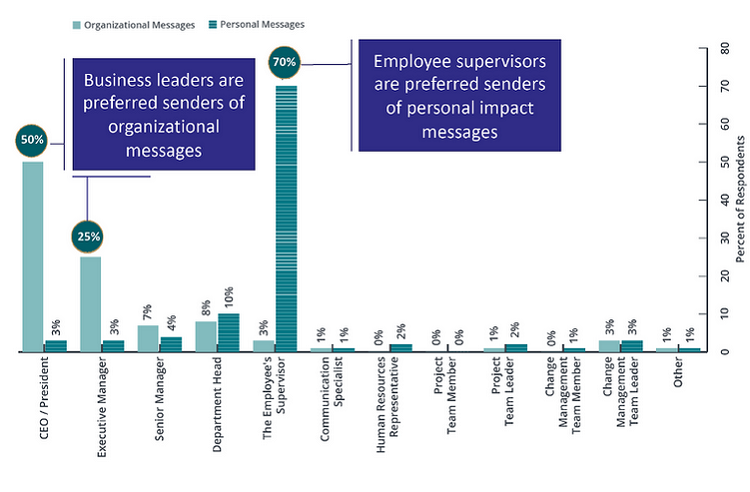Four Roles of Change Agents (early adopters, informal leaders, opinion makers, people of influence, etc)
i) communications (share personal impact messages with direct reports about change; build awareness of the need for change within the organisation, ie addressing the 'why', 'why now' and 'what's in it for me'; staff want to know how the change will affect them and hear that directly from the person they report to.
The below diagram shows that senior management members are the preferred sources of organisational information; while interestingly, the immediate boss is the preferred source of personal messages and to answer questions.

(source: Prosci 2022c)
"...answers to the following question are best delivered by a person's immediate manager:
- What does this change mean to me?
- What's in it for me?
- Why should I get on board?
- Why are we doing this?..."
Prosci 2022c
ii) liaison (engage with and support project team; they provide the link between management and staff; this includes feedback to management on how things are progressing;
"...They are also position to identify functional needs and concerns during the implementation phase of the project..."
Prosci 2022c)
iii) advocate (role model for the change, ie demonstrate support by words and deeds plus encourage participation in the change in active and observable ways; this can involve coaching; most staff follow the lead of their immediate boss, ie if they
"...only passively support or even resist change, their direct reports are likely do the same..."
Prosci 2022c
Therefore, it is essential to adequately resource and train informal leaders so they are well-equipped to effectively lead others through their individual change journey)
iv) manage resistance (identify and mitigate root causes of resistance to change; some tactics for managing resistance include
"...1. Listen to and understand objections
2. Focus on 'what' and let go of the 'how"
3. Remove barriers
4. Provide simple, clear choices and consequences
5. Create hope
6. Show the benefits in a real and tangible way
7. Make a personal appeal
8. Convert the strongest dissenters
9. Demonstrate consequences
10. Provide incentives..."
Prosci 2022d)
